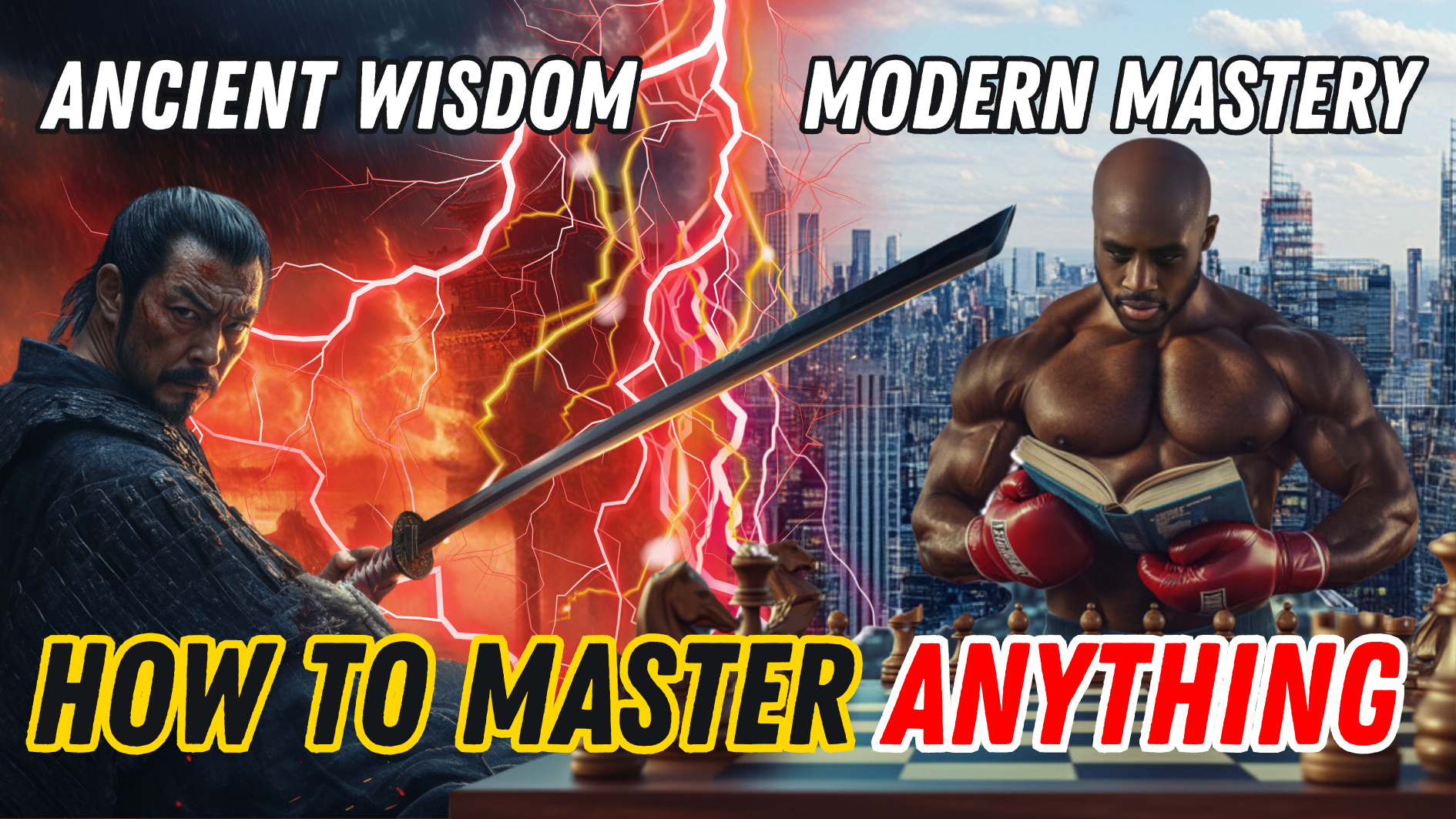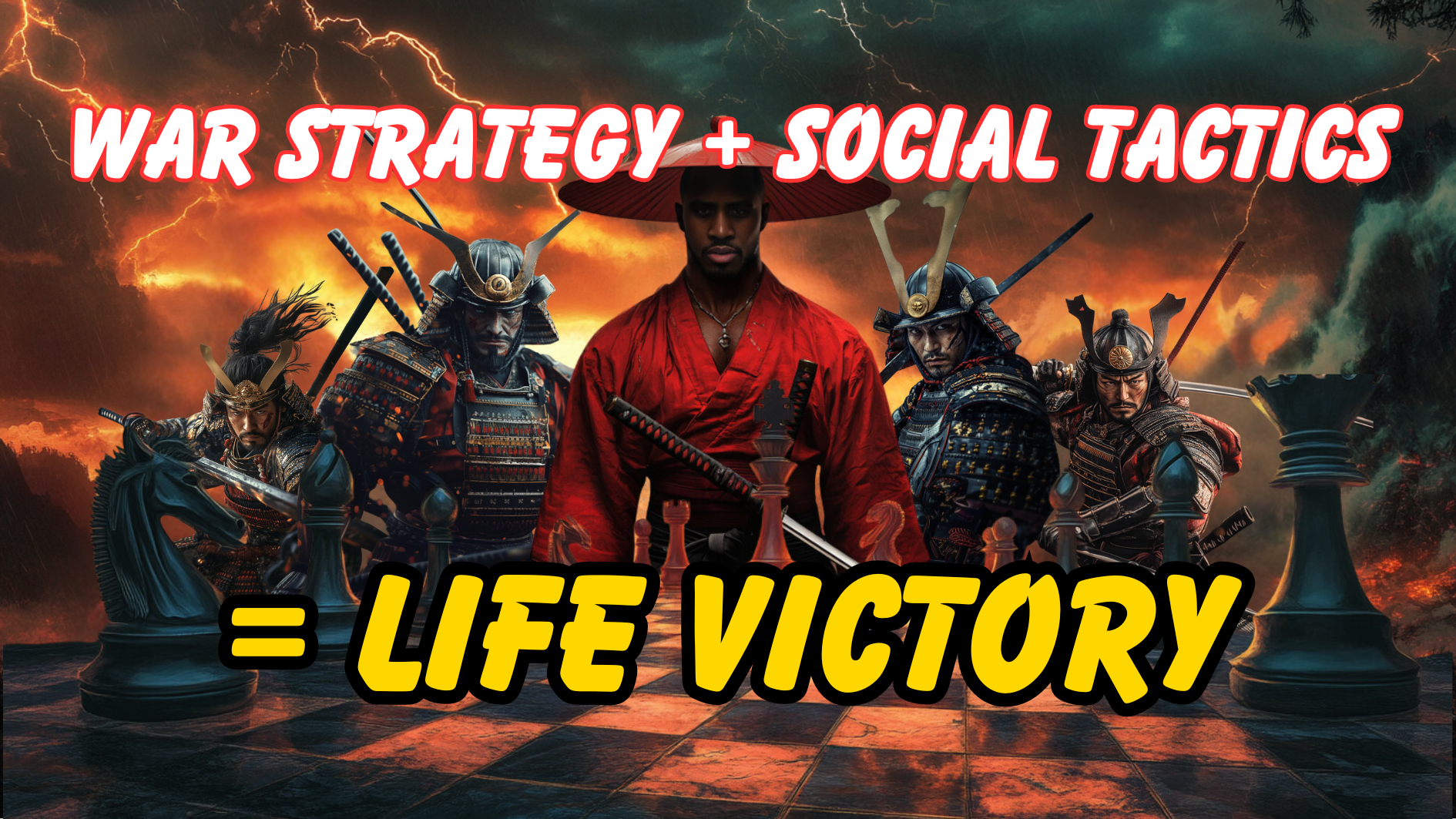The Art of War is an ancient Chinese military guide by military strategist Sun Tzu that was penned around the 5th century B.C. It comprises 13 chapters, each devoted to a different aspect of strategy and or tactics in war.
It’s a surprisingly short read. I read it on my kindle, and the page counter had it pegged at 30 pages, including pre and post-text filler. This makes sense, as it’s actually the lead text in an ancient anthology called “The Seven Military Classics” by Emperor Shenzong of Song.
Watch a my breakdown here
Despite its short length, its ideas apply to many areas of life. The strategies apply to modern warfare, business, negotiation, and relationships.
I read through The Art of War and took notes on what I thought were the most important ideas and quotes. If you don’t have time to read the book yourself or want a refresher, the following are the big ideas and quotes from The Art of War should prove to make you a better combatant in the battleground of life.
The Art of War and adapting to change
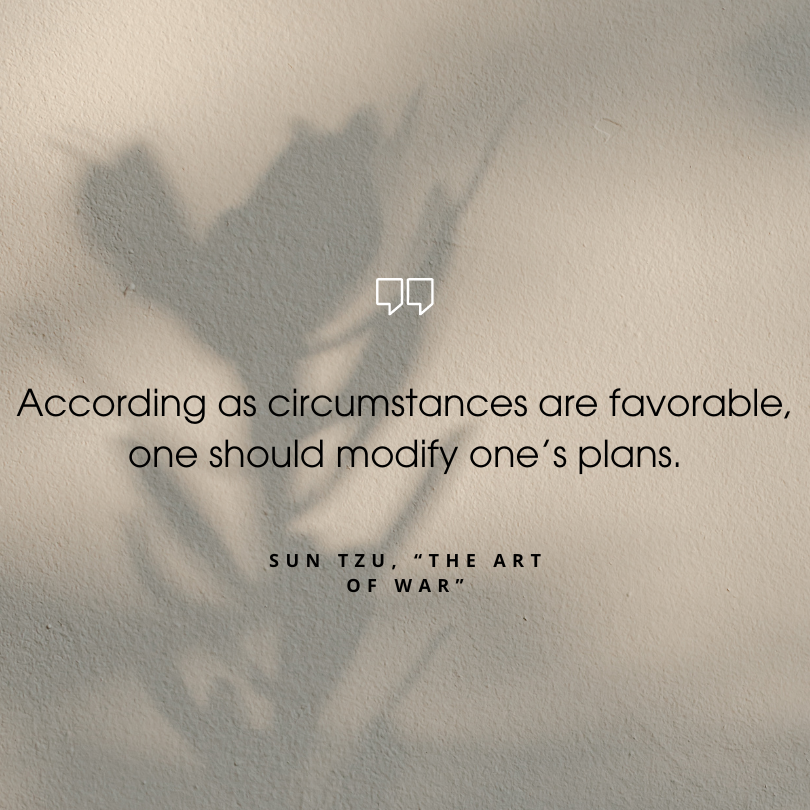
According as circumstances are favorable, one should modify one’s plans.
It doesn’t matter how strong, fast, or organized you are. The only thing that matters is how well you can adapt to change. The spoils of victory have always gone to whoever can anticipate the changes in their environment and quickly create a plan to capitalize on them. Sun Tzu then says:
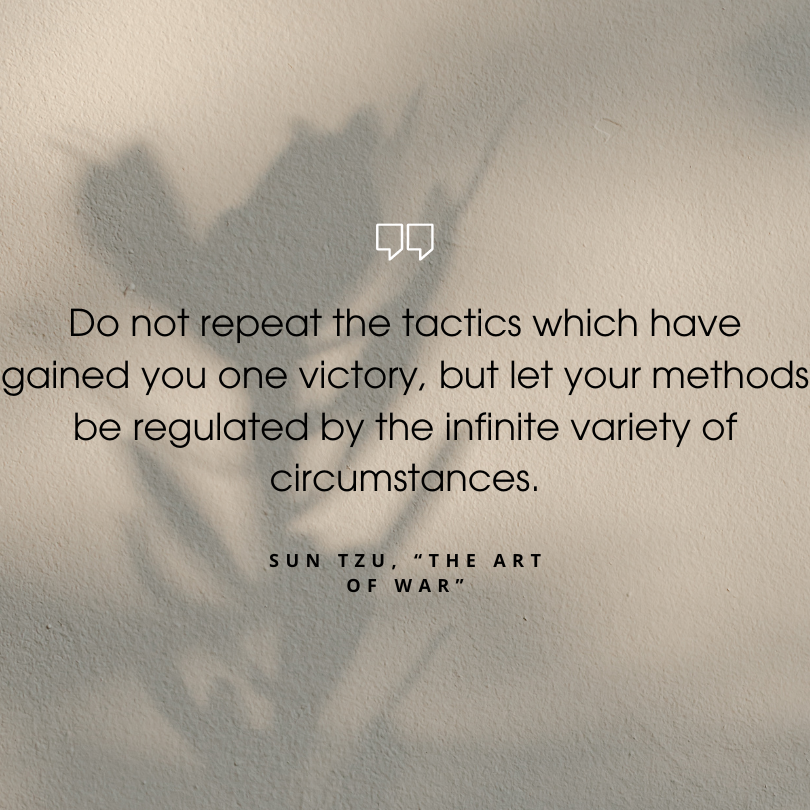
Do not repeat the tactics which have gained you one victory, but let your methods be regulated by the infinite variety of circumstances.
To maintain an advantage consistently, you must anticipate and embrace change. Every new skill you learn should be to increase your flexibility to handle new situations that will inevitably arise. This is why I recommend everyone learn how to write and learn mathematics up to calculus.
I don’t make those recommendations out of loyalty to the subjects. I make those recommendations because problem-solving and communication skills will always be desired. Above all else, the goal is to be a learner.
In addition, you have to learn to be comfortable being uncomfortable. People who don’t handle change well are left behind. New technology emerges too fast for anyone to get comfortable with one approach for too long.
This changing world will leave behind anyone who can’t manage change.
Boxing Lessons on Grit, Resilience, and Antifragility
In this e-book, I teach you 20 mindset lessons I learned from my 13-1-1 professional heavyweight boxing career.
Use these to conquer any challenges you face, in the ring or in life.
Learn how to develop the mindset of a fighter, from a fighter, so you can win the battles you face.
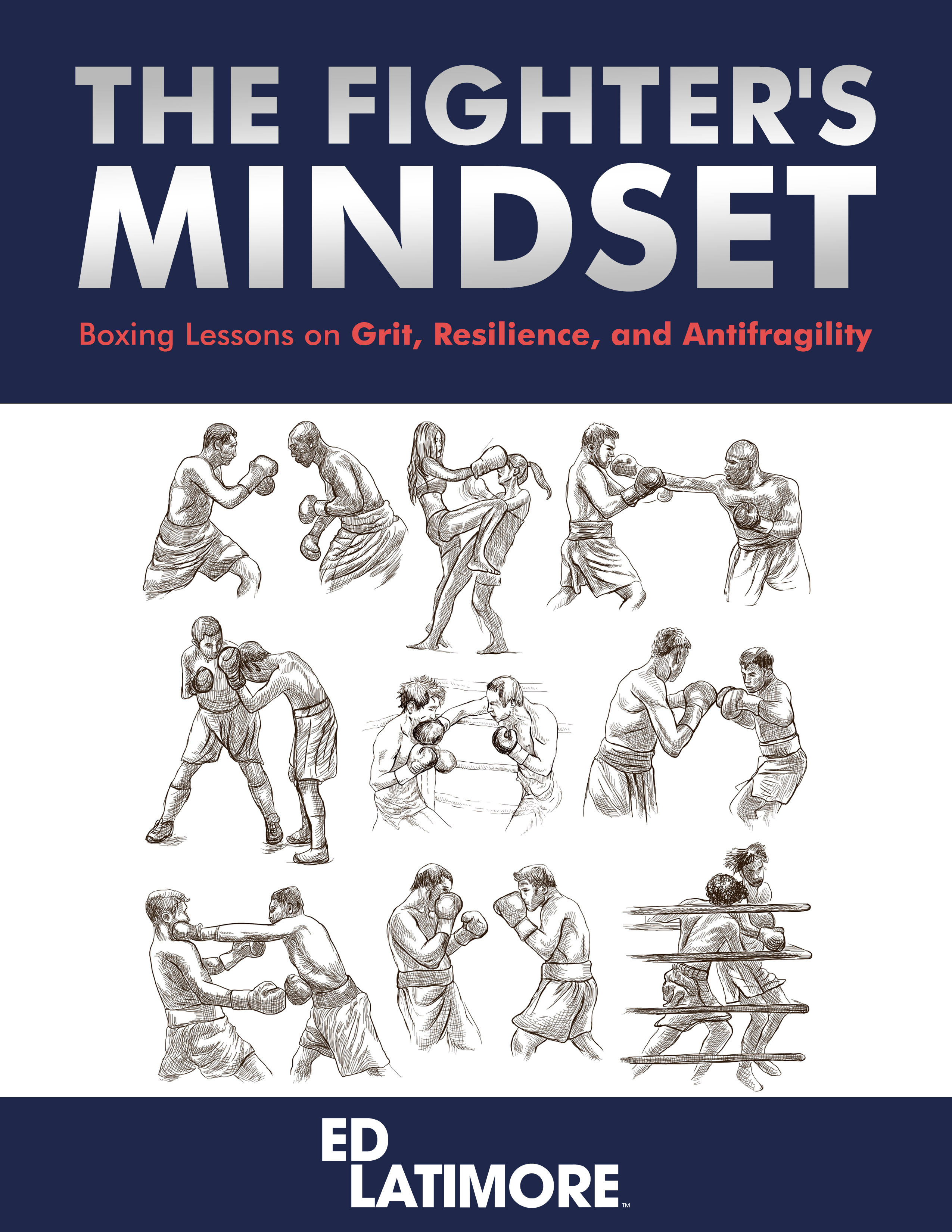
Sun Tzu on bad leadership qualities
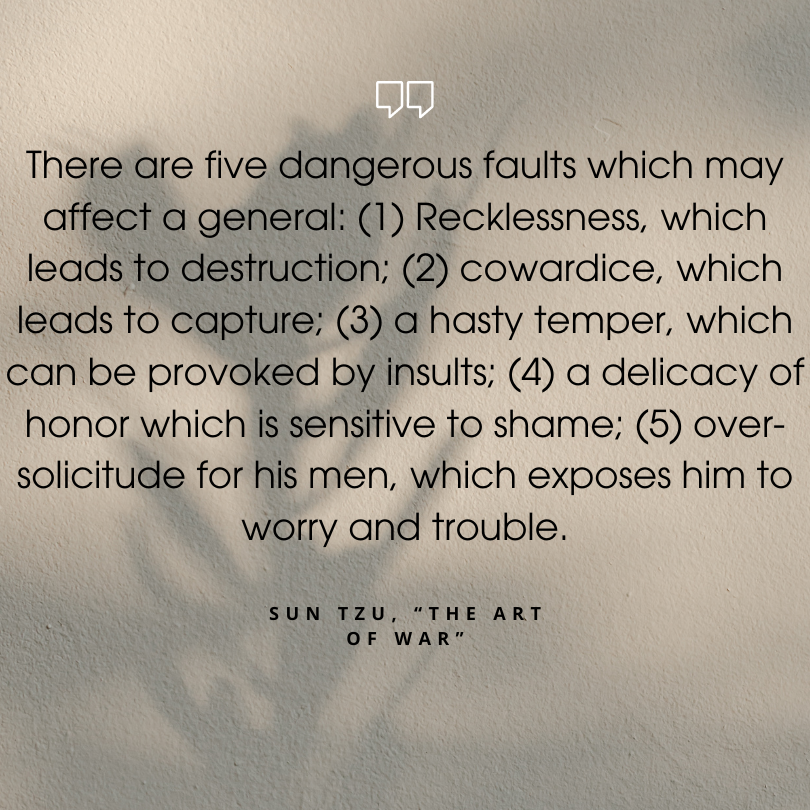
There are five dangerous faults which may affect a general: (1) Recklessness, which leads to destruction; (2) cowardice, which leads to capture; (3) a hasty temper, which can be provoked by insults; (4) a delicacy of honor which is sensitive to shame; (5) over-solicitude for his men, which exposes him to worry and trouble.
A lot has been written about the qualities of great leaders.
However, you can go quite far if you avoid what Sun Tzu calls “the dangerous faults which may affect a general.” Let’s dive a little deeper into the five qualities of a bad leader or general:
Recklessness: While many different leadership and management styles exist, successful leaders are disciplined and measured in their actions. Otherwise, this person won’t be a leader for very long.
A reckless leader takes uncalculated risks, lacks adaptability, and is controlled by passion and emotions rather than strategy and the mission.
Cowardice: Cowardice is probably the single greatest liability a leader can have. In a war, cowards are killed quickly, either by their side for deserting or the opponents because they’re afraid to fight. In less hostile environments, cowards are afraid of confrontation but want the outcome of a confrontation that goes in their favor—and they’re willing to do anything to get it.
This means not enforcing discipline or standing up for their subordinates for less ambitious leaders. More ambitious leaders rely on deception, subterfuge, and outright dishonesty to control or direct their team members.
Bad leadership of this type is always either defeated by the competition, replaced by its superiors, or mutinied by the ones they’re in charge of.
Hasty temper: An effective leader has control of himself and is not prone to emotional outbursts towards the opponent or within his ranks. When a hasty temper is projected outwards, it’s recklessness. When directed towards the team, it’s a bad disposition or hasty temper.
It’s normal to encounter frustration en route to your goals, but a poor leader takes that frustration out on his subordinates, creating a hostile work environment. This leads to low retention and even lower morale and team performance.
Delicacy of honor which is sensitive to shame: Generally speaking, honor and dignity are positive traits. The best leaders are known for holding themselves and their subordinates to a certain standard. However, there are two notable situations where this honor becomes a liability.
First, when the opponent is not honorable, you place yourself and your team at great risk if you believe there is some merit in meeting a dishonorable opponent with only honorable tactics.
When you do this, you have ruled out certain tactics while the opponent knows no such limits. This is fine and acceptable in contests where nothing is on the line. But when life or liberty is at stake, this is poor leadership.
The second instance where sensitivity to shame is a weakness is when you face unfavorable conditions or defeat and refuse to back down or change course. If you lead your team to slaughter and you don’t have to, and you won’t change your mind because of honor, it becomes a dishonorable decision.
Over-solicitude for his men: Another way to say this is “having too much concern for your men.” While a lack of empathy from a leader can drain group morale and sap loyalty, Sun Tzu recognized that a good leader can’t be too concerned for the well-being of his men. Otherwise, he will not put them in harm’s way, which was vital in war.
In modern-day company culture, the equivalent of this idea would be a boss afraid to ask his employees to stay late, pick up extra work, or come in on their day off.
While there’s a lot to be said about cultivating a work/life balance, good leaders recognize that you have to put in extra work if you want to win. This means cultivating an environment where everyone is expected to have an incredible work ethic.
This can only happen if the boss doesn’t care too much.
What the Art of War say about leading a team
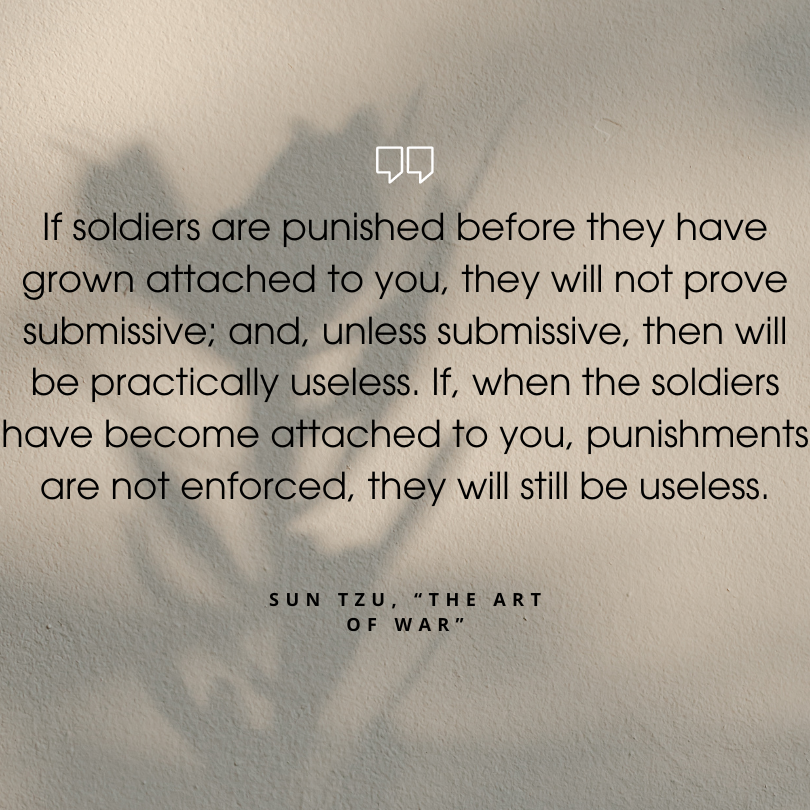
If soldiers are punished before they have grown attached to you, they will not prove submissive; and, unless submissive, then will be practically useless. If, when the soldiers have become attached to you, punishments are not enforced, they will still be useless.
Great leaders know how to navigate two interesting facts about human nature:
- People like who they listen to more than they listen to who they like.
- People like who they respect more than they respect who they like.
Great leaders know that trying to be liked before you’re respected and obeyed is putting the cart before the horse. They also understand that being liked doesn’t usually lead to respect, especially when there is a status difference.
The conclusion is that to be an effective leader, you can not worry about how much your team likes you. It’s nice if they do, but it is inconsequential to the mission’s success. It’s often a bad thing if they like you. Sun Tzu elaborates by saying:
When the people you’re in charge of like you too much, they become attached. When they become attached, they start to view themselves as equal, which makes it hard for them to obey your orders. This leads to a need for discipline, but you become less motivated to enforce discipline because you naturally start to like them in return.
Cruelty before kindness makes their loyalty strong
— Ed Latimore (@EdLatimore) December 28, 2020
Kindness before cruelty and soon your head will be gone
In this passage, Sun Tzu recognizes the danger of becoming too familiar with your subordinates. Anyone who’s ever been in the military recognizes this structure today, as there is no fraternizing between officers and enlisted men or between non-commissioned officers and lower enlisted.
This is not to say that you should go out of your way to be unlikable. That’s a recipe for failure, also. As a team leader, you should make the best decisions to lead your team members to success. Their feelings towards you aren’t unimportant. They’re just none of your concern.
Your concern is order and effectiveness. If you do this while treating everyone with respect, you will also be respected, which naturally leads to being liked anyway.
The Art of War shows you how to prepare for conflict
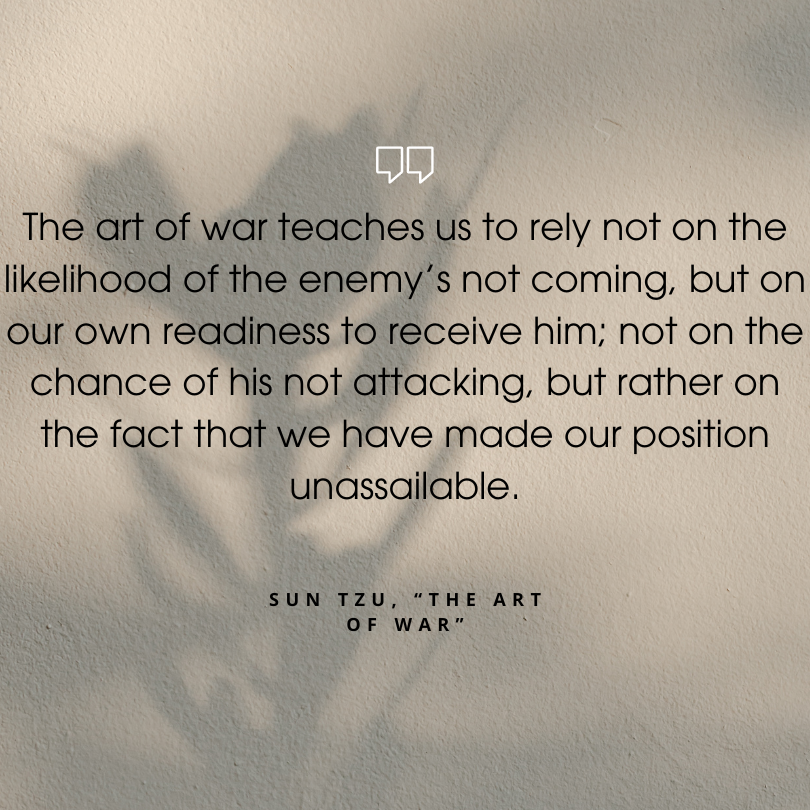
The art of war teaches us to rely not on the likelihood of the enemy’s not coming, but on our own readiness to receive him; not on the chance of his not attacking, but rather on the fact that we have made our position unassailable.
Sun Tzu combines two pieces of colloquial wisdom in this passage:
- “Hope for the best, but plan for the worst.”
- “Failure to plan is planning to fail.”
As a professional boxer, I trained hard for every opponent, regardless of his record. It would be foolish to assume he was coming to lose just because my opponent had more losses than wins.
By training hard for my opponent, the worst-case scenario is that I would be prepared to fight well, no matter what he entered the ring with. The best-case scenario is that my opponent would be completely overwhelmed by abilities and preparation.
It doesn’t matter what your plans are. You can increase their likelihood of coming to fruition if you consider how things can go wrong and devise a method to prevent or mitigate them.
Most people only focus on the upside of their plans. They imagine that everything will go well, with only minor resistance. However, anything worth doing tends to sprout a major problem that almost acts as a way to weed out the unprepared and unworthy.
You can make it pretty far if you only focus on preparing for the ways you won’t.
What Sun Tzu says about how to know who is capable
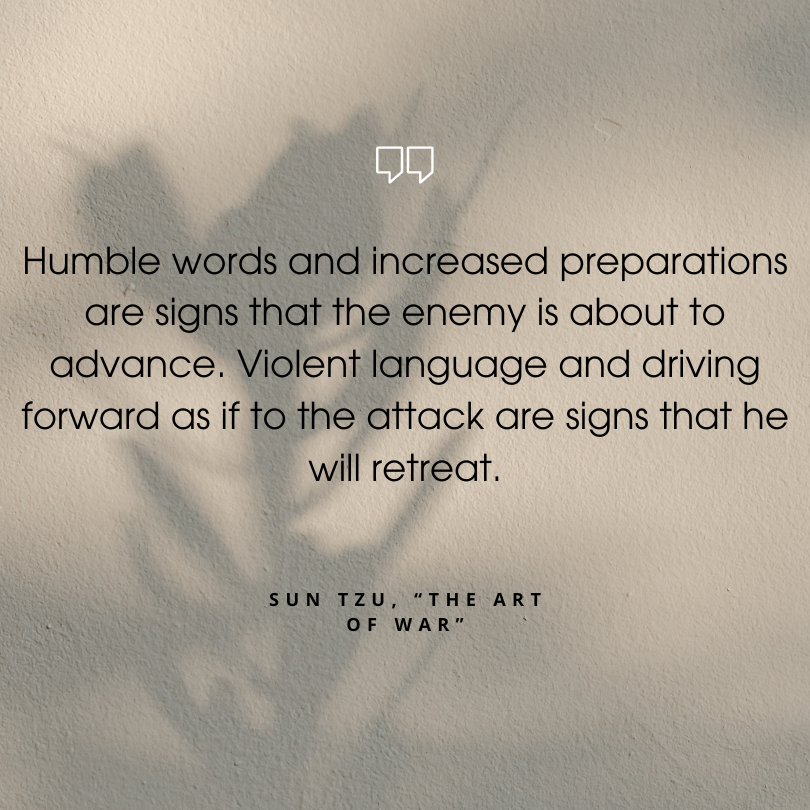
Humble words and increased preparations are signs that the enemy is about to advance. Violent language and driving forward as if to the attack are signs that he will retreat.
Though this is not always true, people who talk a lot are not the ones who get things done.
Talk is cheap. Anyone can do it. Because anyone can say anything, it doesn’t have much worth. That’s not the only problem with people who spend a lot of time talking about what they’re going to do instead of doing it.
They also aren’t doing things if they’re busy talking about doing things. People who have done things like to show that they’ve done things for no reason other than it distinguishes them from talkers.
Here’s another way to look at this: if someone is capable of performing a task, you’ll either have heard about them, or they will show you what they’ve done. They will not just rely on their boasts. This reminds me of a line from the rapper Young Jeezy in his song “This one’s for you.”
Had these ni**as tellin’ lies, they just sound true
Ni**a if you had it like that I would’ve found you-Young Jeezy, “This one’s for you”
How the Art of War Teaches us to train
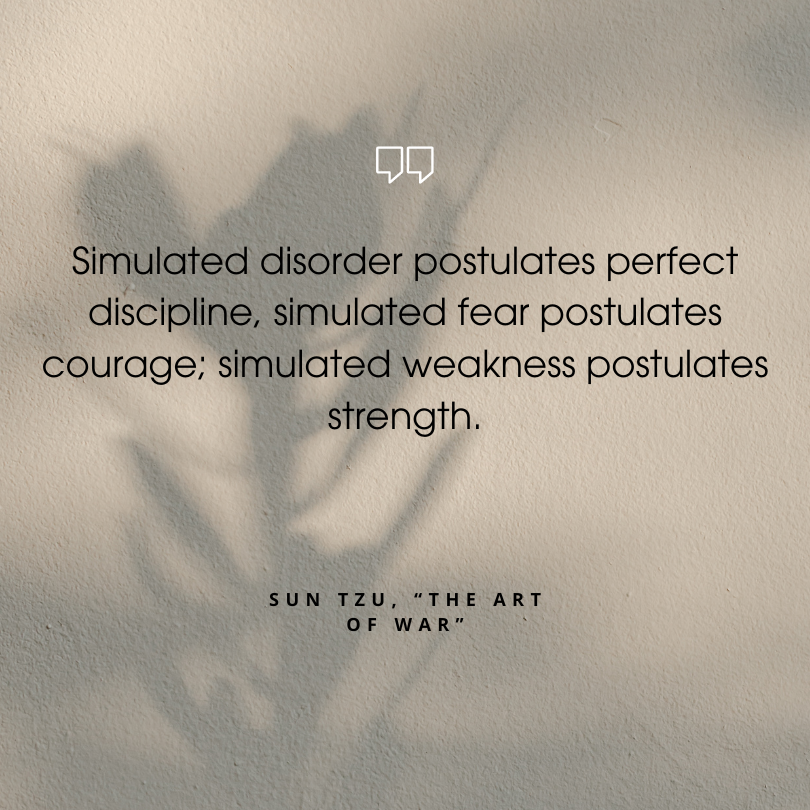
Simulated disorder postulates perfect discipline, simulated fear postulates courage; simulated weakness postulates strength.
You must train how you plan to perform and prepare under the most difficult and varied conditions you can create. The goal is to ensure that practice does not occur in a safe and predictable setting because the contest or task will not occur in such an area.
- You practice when you’re tired.
- You introduce random distractions and variables into the practice arena.
- You reduce your resources and capabilities.
The goal of practice is to hone your skills in an environment that most closely resembles the one you’ll be using.
This means that you have to handicap yourself and do your best to create an environment that exposes you to the tribulations of combat, whatever your particular type of “combat” is. Performers, athletes, speakers, etc. You must train yourself to execute in all conditions to be ready for anything.
This also does wonders for your confidence, making it even easier for you to perform.
Sun Tzu enlightens us on the importance of emotional strength
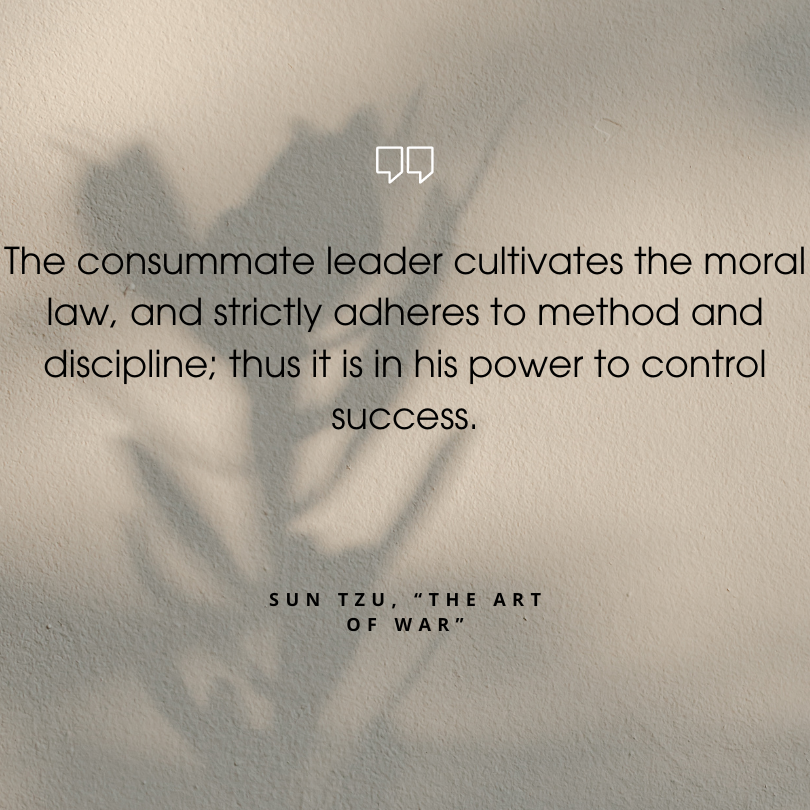
The consummate leader cultivates the moral law, and strictly adheres to method and discipline; thus it is in his power to control success.
It’s easy to give in to your basic instincts and urges. However, this usually results in a negative outcome. As a leader, this can have devastating effects on your team’s morale and respect for you.
This is how abuses of power occur. The leader uses rank or title to take advantage of or take things from his people. If you are not disciplined enough to keep your desires in check, you can be manipulated by the enemy and lose your allies’ support.
This is something I learned while getting sober. Putting down the bottle made it impossible to manipulate me by offering me free drinks. It kept me out of many places where there could be threats to what I valued.
[Read a few other things I learned about getting sober here.]
Self-knowledge and letting the enemy beat himself
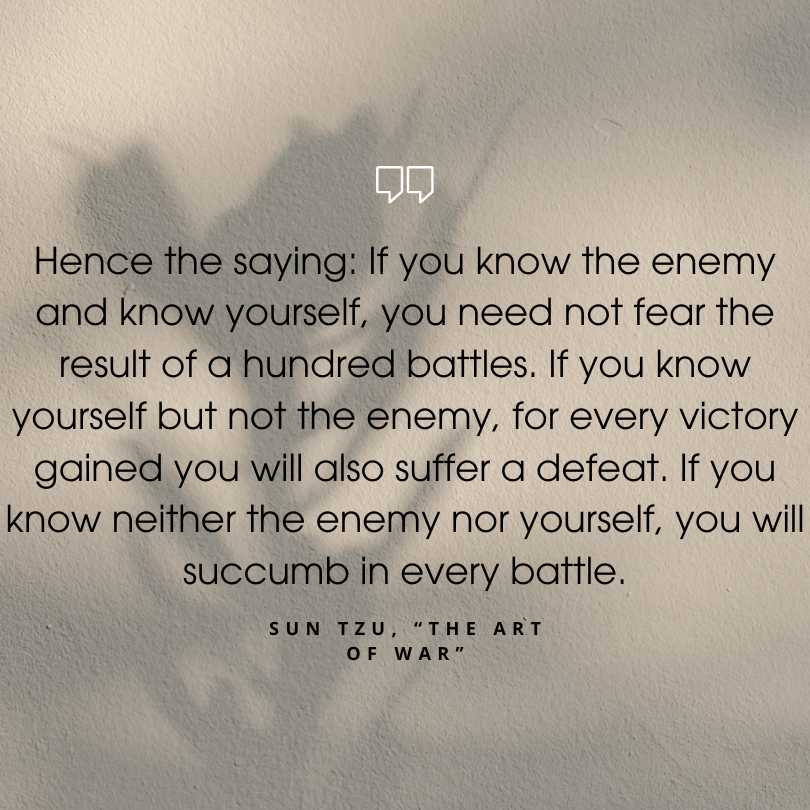
Hence the saying: If you know the enemy and know yourself, you need not fear the result of a hundred battles. If you know yourself but not the enemy, for every victory gained you will also suffer a defeat. If you know neither the enemy nor yourself, you will succumb in every battle.
If you take a meta-view of any clash, there are only two factors to consider: you and what stands in your way.
If you know yourself and the obstacle well, there’s no reason you shouldn’t be successful in getting what you want. This is why we study, practice, and prepare. We must simultaneously make ourselves as capable as possible while becoming familiar with the challenge before we face it. Sun Tzu then goes on to say:
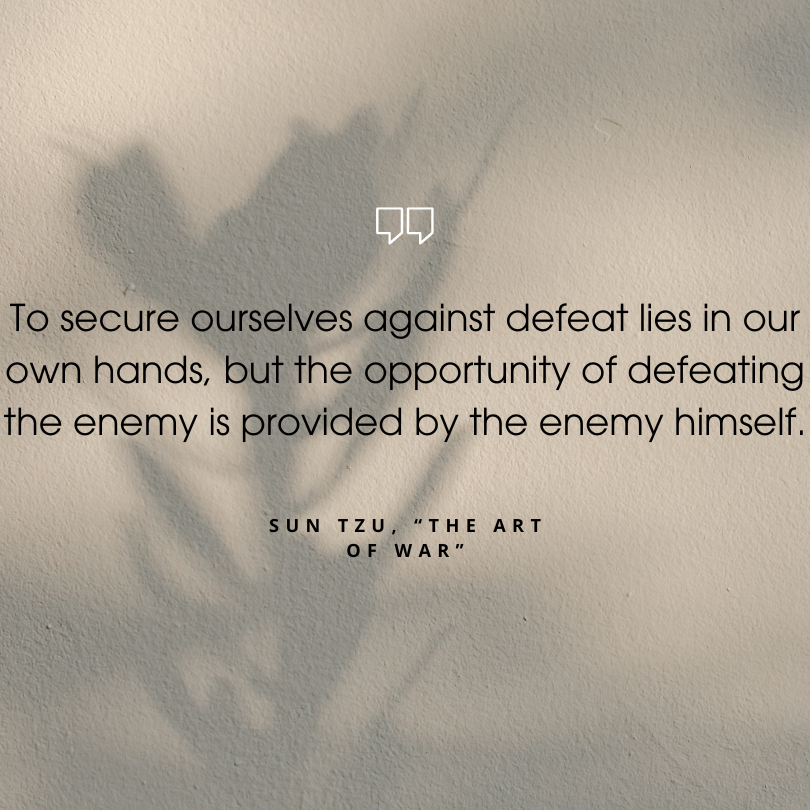
To secure ourselves against defeat lies in our own hands, but the opportunity of defeating the enemy is provided by the enemy himself.
When I was a boxer, I used to tell people that I didn’t worry about what the other guy did because I was in control of my training. I knew I’d be very difficult to beat if I put supreme effort into my training regimen, sharpening all my rough edges and systematically eliminating my flaws.
Don’t get me wrong: my coach still studied the fighter and prepared me for his weaknesses, so we pooled our resources that way. I learned of myself, and he learned of the opponent. This nearly guaranteed victory.
The second passage reminds me of something I observed during my chess training.
A chess game is usually won by the person who makes the next to the last mistake. This means that many matches are lost rather than won until you get to the upper levels of chess. I’ve always felt like this observation applies in many other areas.
You can do well in life if you focus on reducing the number of mistakes you make. Rather than be brilliant, try to be less stupid. It’s amazing how brilliant you appear if you take this approach.
The sign of a good plan according to the Art of War
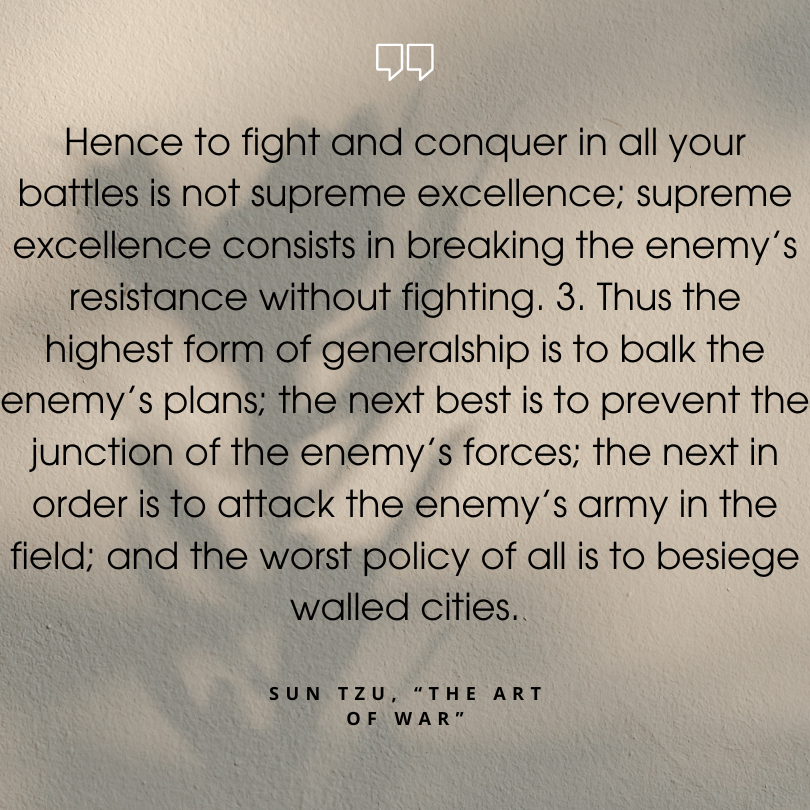
Hence to fight and conquer in all your battles is not supreme excellence; supreme excellence consists in breaking the enemy’s resistance without fighting. 3. Thus the highest form of generalship is to balk the enemy’s plans; the next best is to prevent the junction of the enemy’s forces; the next in order is to attack the enemy’s army in the field; and the worst policy of all is to besiege walled cities.
Generally speaking, a good plan maximizes your gains, minimizes your losses, and does so as quickly as possible. Though Sun Tzu specifically talks about preparation for battle here, we can extrapolate this to other contests.
Ideally, you’d get what you want without having to risk anything at all. While every action is an investment of time, the idea is that you don’t waste too much of it when you go after what you want. Of course, this isn’t usually what happens, but ideally, we’re trying to approach every time we plan.
When I first turned pro as a boxer, my coach explained our plan for my development. He used the analogy that developing a fighter was like navigating a boat through a hurricane: you can go through it, or you can go around it.
If I did everything right, we’d get to take the route around the hurricane. Still, if I had a loss early or marketed myself incorrectly, I’d have to go on a harder path to development, thus going through the hurricane. Life is a lot like this.
Achieving your goal is remarkably easy if you plan and execute well. If you just wing it, you will likely find yourself besieging the walls around your goals.
Boxing Lessons on Grit, Resilience, and Antifragility
In this e-book, I teach you 20 mindset lessons I learned from my 13-1-1 professional heavyweight boxing career.
Use these to conquer any challenges you face, in the ring or in life.
Learn how to develop the mindset of a fighter, from a fighter, so you can win the battles you face.

Sun Tzu advises the use of deception to win
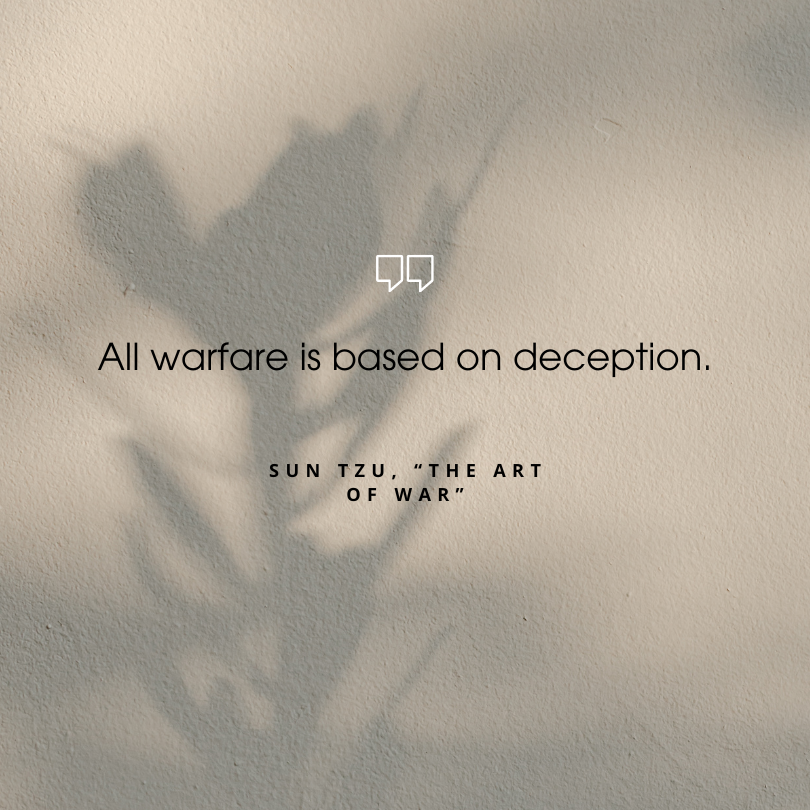
All warfare is based on deception.
Whenever you make an error in execution, it’s either due to bad technique or insufficient information. You can correct bad techniques through training, but if you get the incorrect information, then there is a possibility that you have been deceived.
This is a powerful advantage if you can make someone think you have (or don’t) something that influences their actions. In this way, you can lull your opponents into situations where they believe they’re strong but are weak. Likewise, you can prevent them from making strong moves on to your position because they believe you’re stronger when the reality is that they’d crush you.
Sun Tzu continues with this point by saying:
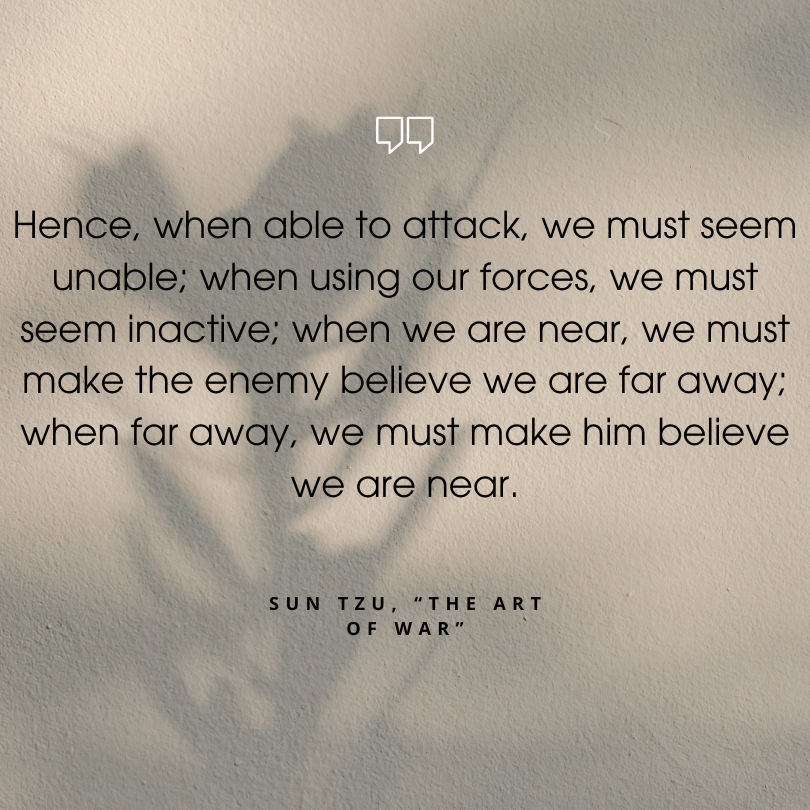
Hence, when able to attack, we must seem unable; when using our forces, we must seem inactive; when we are near, we must make the enemy believe we are far away; when far away, we must make him believe we are near.
Ultimately, the power of deception is that it bends your opponent’s perception of reality to one that more closely aligns with your goals rather than theirs. Though we typically frown on outright deception in social and business matters, it’s often used to make others think they have a higher value.
In social and business matters, the best defense against deception is inspection. You aren’t in a war, and (usually) your life isn’t on the line, so you can dig into appearances so that they don’t fool you.
Summary of what the Art of War teaches us about life
- Know your enemy
- The acme of skill is to win battles without fighting
- Victorious warriors are always able to adapt to change
- Disorganization is a sign of bad leadership
- Train in the worst conditions so you can perform in the midst of chaos
- Real intent is rarely revealed by words alone



